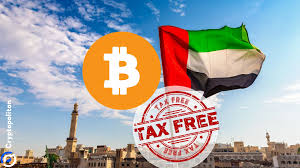Now Reading: Cryptocurrency Taxation in the UAE: A Comprehensive Guide for 2025
-
01
Cryptocurrency Taxation in the UAE: A Comprehensive Guide for 2025
Cryptocurrency Taxation in the UAE: A Comprehensive Guide for 2025

Table of Contents
Cryptocurrency Taxation in the UAE: The United Arab Emirates (UAE) has rapidly emerged as a leading global hub for virtual assets, driven by its progressive regulatory frameworks and a commitment to fostering innovation in the digital economy. However, with the introduction of a federal Corporate Tax and evolving global standards, understanding the nuances of cryptocurrency taxation in the UAE has become crucial for both individuals and businesses. As of May 2025, the UAE offers a uniquely favorable tax environment for crypto assets, though specific activities and entity types do fall within the tax ambit.
The Overarching Tax Stance: A Zero-Tax Haven for Individuals

For individual investors and traders, the UAE remains a highly attractive jurisdiction. The fundamental principle of no personal income tax or capital gains tax in the UAE extends to cryptocurrency activities. This means:
- Zero Income Tax: Profits derived from trading, holding, staking, or mining cryptocurrencies by individuals are generally not subject to personal income tax.
- Zero Capital Gains Tax: When individuals sell their crypto assets for a profit, these gains are entirely tax-free.
- Personal Mining and Staking: Rewards from personal mining or staking activities are also not considered taxable income for individuals.
- NFTs for Collectors: For individual collectors, buying and selling Non-Fungible Tokens (NFTs) does not incur capital gains tax.
This makes the UAE, particularly Dubai, a magnet for individual crypto enthusiasts and investors seeking to maximize their returns without a direct tax burden on their digital asset profits.
Corporate Tax Implications for Crypto Businesses

While individuals largely enjoy a tax-free environment, businesses engaged in cryptocurrency-related activities fall under the scope of the UAE’s federal Corporate Tax (CT) law, effective for financial years starting on or after June 1, 2023.
The standard Corporate Tax rate is:
- 0% for taxable income up to AED 375,000.
- 9% for taxable income exceeding AED 375,000.
For crypto businesses, this means:
- Taxable Activities: Companies involved in commercial crypto operations, such as virtual asset exchanges, brokerage services, custodial services, proprietary trading desks, large-scale mining farms, NFT studios, or entities offering DeFi services as a business, will be subject to Corporate Tax on their net profits exceeding the threshold.
- Revenue from Crypto Activities: Revenue generated from these business activities (e.g., trading fees, service charges, profits from proprietary trading, income from providing mining services for others, proceeds from NFT mints/sales by a studio) contributes to the company’s taxable income.
- Deductible Expenses: Businesses can typically deduct allowable expenses (e.g., gear depreciation, electricity costs for mining, exchange fees, operational overheads) from their gross crypto revenue before calculating their net profit.
- Airdrops and DeFi: For businesses, airdropped tokens or profits from DeFi activities (like yield farming) are generally treated as income at their fair market value for corporate tax purposes if they are part of the firm’s operations.
- Crypto Losses: Corporate entities can deduct trading losses from other crypto revenue, which reduces their overall taxable income.
Value Added Tax (VAT) on Crypto Transactions
The UAE levies a 5% Value Added Tax (VAT) on the supply of most goods and services. The application of VAT to cryptocurrency transactions is nuanced:
- General Rule: Cryptocurrencies are generally not considered “money” for VAT purposes but rather as virtual assets.
- Taxable Supplies: If a business provides a service or sells goods and accepts cryptocurrency as payment, the transaction’s AED value is subject to VAT if the business is VAT-registered and the supply is taxable.
- Crypto Mining:
- Mining for Own Account: Cryptocurrency mining by an individual or business for their own account (i.e., receiving rewards from the network with no identifiable customer) is generally not considered a taxable supply for VAT purposes. Consequently, input VAT on associated costs (e.g., electricity, hardware) for this activity cannot be recovered.
- Mining as a Service: If a business provides cryptocurrency mining services on behalf of another person (e.g., through mining pools where a fee is earned), this is considered a taxable supply of services, and the standard 5% VAT would apply to those earnings. Input VAT can be recovered in this scenario.
- NFT Sales: For NFT creators or businesses regularly trading NFTs, the sale revenue may attract VAT, depending on the nature of the supply and the business’s VAT registration status. For individual collectors, NFT sales are generally not subject to VAT.
The Role of Free Zones in Crypto Taxation
The UAE’s numerous Free Zones play a significant role in its crypto ecosystem. While the federal Corporate Tax applies across the UAE, including free zones, qualifying Free Zone entities can benefit from a 0% Corporate Tax rate on “qualifying income” if they meet specific conditions:
- Qualifying Free Zone Person (QFZP): To achieve QFZP status, a free zone entity must maintain adequate economic substance, derive qualifying income (which generally excludes mainland-sourced income unless specifically permitted), and not elect to be subject to the 9% CT rate.
- Benefits for Crypto Businesses: Many crypto businesses (e.g., virtual asset service providers, blockchain developers) choose free zones like the Dubai Multi Commodities Centre (DMCC), Abu Dhabi Global Market (ADGM), or Dubai International Financial Centre (DIFC) due to their robust regulatory frameworks and potential for 0% corporate tax on qualifying activities.
- Impact of Global Minimum Tax (Pillar Two): For large multinational enterprise (MNE) groups with consolidated global revenues exceeding €750 million, the UAE has introduced a Domestic Minimum Top-Up Tax (DMTT), effective January 1, 2025. This ensures that even if a free zone entity has a 0% domestic CT rate, if its effective tax rate for GloBE purposes falls below 15%, the difference will be topped up to 15% domestically. This is crucial for MNEs operating in free zones.
Regulatory Framework and Compliance
The UAE has established a multi-layered regulatory framework for virtual assets to ensure investor protection, market integrity, and compliance with Anti-Money Laundering (AML) and Counter-Terrorism Financing (CFT) standards:
- Virtual Assets Regulatory Authority (VARA): Established in Dubai, VARA is a dedicated independent authority for virtual assets. It licenses and regulates virtual asset service providers (VASPs) in Dubai, including its free zones (excluding DIFC). Its comprehensive rulebook covers various virtual asset activities.
- Securities and Commodities Authority (SCA): The SCA is the federal regulator for virtual assets across the UAE mainland and certain other free zones. It licenses and supervises VASPs falling under its purview, ensuring compliance with federal laws.
- Financial Services Regulatory Authority (FSRA) & Dubai Financial Services Authority (DFSA): These regulators oversee virtual asset activities within the ADGM and DIFC financial free zones, respectively, each with its own comprehensive regulatory regimes tailored for financial innovation.
Compliance requirements include obtaining necessary licenses, adhering to AML/KYC procedures, regular reporting to the relevant authority, and maintaining detailed transaction records. For businesses, this includes maintaining proper accounting records for corporate tax filings, even if no tax is due.
Challenges and Future Outlook (2025-2026)
While the UAE offers a clear and competitive tax regime for crypto, certain aspects continue to evolve:
- Distinguishing Personal vs. Business Activity: For individuals, the line between casual trading (tax-free) and operating a commercial crypto business (taxable) needs careful consideration. Factors like frequency of transactions, reliance on crypto for livelihood, and use of business structures determine classification.
- Evolving Definitions: As new crypto products and services emerge (e.g., complex DeFi protocols, new types of NFTs, tokenized real-world assets), their precise tax classification will continue to be refined through guidance from tax authorities.
- Global Harmonization: The UAE, as an OECD member and FATF participant, will continue to align its regulations with international best practices regarding virtual assets, potentially influencing future tax treatments.
- Increased Scrutiny: As the crypto market matures globally, and with the UAE’s explicit tax framework for businesses, there will likely be increased scrutiny and enforcement by the Federal Tax Authority (FTA) to ensure compliance.
- Technological Solutions: Crypto businesses and savvy individual investors are increasingly utilizing crypto tax software and professional advisors to manage records and ensure compliance with the evolving landscape.
In conclusion, the UAE’s approach to cryptocurrency taxation in 2025 positions it as a highly attractive destination, particularly for individual investors. For businesses, while the 9% Corporate Tax applies, the robust regulatory environment, strategic free zone benefits, and the overarching commitment to fostering a digital economy ensure that the UAE remains a vibrant and competitive hub for the global virtual asset industry. Navigating this landscape requires careful attention to the specific nature of activities and diligent compliance with the established regulatory and tax frameworks.
WATCH MORE: https://www.youtube.com/watch?v=_X8Lh2b7kFk
READ MORE: Impact of Global Tax Reforms on UAE Businesses: Shaping Future Growth






















